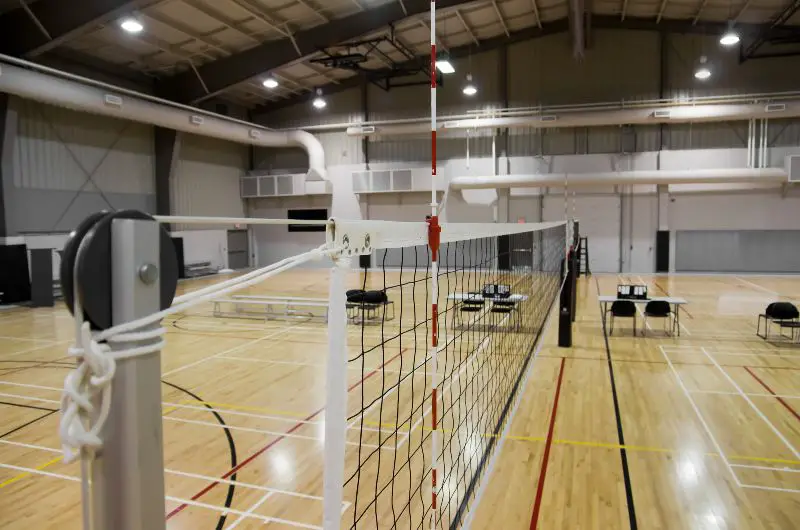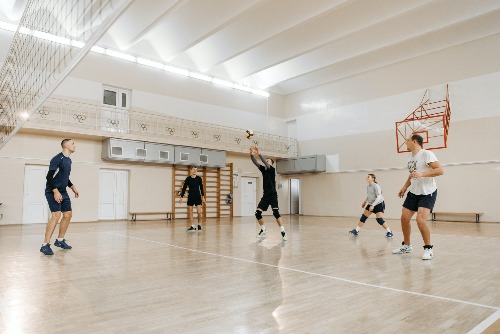
Approaching your volleyball games and training sessions in winter like the other seasons is probably a mistake…
Indeed, combining how physically demanding volleyball is with the cold weather might lead to some kinds of injuries as long as the preparation is not right.
In this article I breakdown a safe and effective approach to play volleyball during the cold season. This will hopefully prevent any unnecessary harm and will help you perform at the best of your abilities.
Tips to Warm-up for volleyball in winter
During the winter season, it is very tough for a human brain to get the body out of its comfort zone and prepare it for a practice session.
That’s why implementing a proper warm-up approach is super necessary. Below some helpful tips …
Start at your bed
The most difficult part during winters is to get out of bed. So why warmup your brain in your bed…
Rather than straight jumping off the bed, sit in your bed for five to ten minutes. During that time, meditate and get your mind ready for a good practice session.
Positively retrospect and give yourself a boost to get off the bed and your comfort zone as well.
Cardio exercises
The most important and yet the most neglected part of the warmup process are the cardio exercises. Their role in winters gets all the way more crucial…
Volleyball is an endurance-based sport. And yes it is all about Stamina!
You should go for a good run. It would prepare your body for upcoming challenges. This could well be followed by other cardio exercises like shuttle running and skipping.
Stretching
The body gets stiff during winters. A good stretching session during the warmup will provide great benefits in that regard.
You should stretch well during warmup, it not only opens the body up but also reduces the chances of any muscle injury.
Passing drill

After your body is warmed up, start touching the ball by executing some passing drills. Pass the ball amongst your teammates as you would do in an actual game …
This will open up shoulder joints, generate a flow within the team and get you prepared for the actual game.
Learn more about the perfect setting in indoor volleyball!
Defence and offence
Practicing collectively defence and offence will help warmup the whole team all together…
To practice offence and defence, divide the team into two parts, one would defence while other offences and vice versa.
This will get every player comfortable with doing offence and to play defensive as well.
What should you wear?
Another important thing to keep in mind while going to practice in winters is the clothing. You cannot freely move around in your match kit and also not play while being fully paced.
Well, you should start with your feet! Make sure you’ve got proper volleyball shoes (Check this example Here at Amazon). Why?
They are conceived to help you execute all volleyball movements with minimum impact on your feet. Indeed, during winter the most common injuries are located in the feet/leg zone (example: tendon, ankle …)
Other than that, you should layer up clothes to avoid being caught by cold. Every player should wear their game kit underneath, which is a jersey and shorts.
You should layer it up with a lower and a jacket. Better keep on the layers till your body get warmed up.
Check this complete clothing list for indoor volleyball …
How do you practice volleyball in the cold?
Following are some key points to keep in mind while practising in winters:
Again, Proper warmup and stretching: As discussed earlier, you should have a good warmup and stretching session during winters. It gets the body warm and prepares it for the challenges ahead. It also reduces the risk of any injuries. In winters, the role of warmup is further accentuated. The muscles are more stiff and rigid as compared to summers. You should consider doing an excess warmup and stretching exercises to stay active during the game.
Avoid rushing for the ball: Many players avoid the earlier steps and rush straight into the ground to play. This can lead to severe injuries. To avoid any such scenarios, one should have patience and follow the process.
Wear safety guards: wearing safety guards (Check this example Here at Amazon) can minimize the risk of injuries to a great extent. These protect the muscles from overstretching, hence reducing the possibility of injuries.
How often should you practice volleyball in winter?
You should keep in mind that the muscles need some rest. However, you can train the same as you used to do in the other seasons.
Ideally, you should train an hour an half during the usual time and more than a couple of hours when you are actually preparing for a tournament.
The frequency must remain between four to five times a week and two days must be kept as rest days. Rest days are also crucial as they give muscles the necessary time to repair and heal. Skipping rest days can lead to problems like muscle pulls and tears.
Mistakes to avoid while playing volleyball in the cold
When it comes to mistakes, there is a ton! However, these are the ones you should avoid the most …
Avoiding a run: Running is by far the most crucial aspect of a warmup session. It not only warms your body up but also builds your stamina. Many people neglect this part of the training as it is a bit monotonous.
Not having a proper sleep schedule: I cannot emphasize much on how important this point is. Having a good sleep schedule is a must for every athlete. It gives the player energy to perform well the next day. Also it gives enough time for muscles to be healed. You cannot keep on binge watching shows late at night and show up at practice the next morning. This will drain out the energy and it’ll be obvious on the player’s face the next morning. So it’s advisable for a player to maintain a proper sleep schedule and be on time for everything.
Pre-training meal: An unhealthy meal can ruin your training session entirely. For instance, having a pizza right before practice will surely make you regret your decision during the cardio. Eat healthy before and after the training as well.
Final Thought …
One last important point is your diet. As an athlete, you should have a very balanced diet especially in winter. This will help you a lot for games and training sessions …
During winter you should consider include more healthy fats (nuts and fish …), as they help in keeping the body warm.
Nuts and other dry fruits can be taken before the practice to boost the body. Being hydrated is yet another important aspect.
In winters most people tend to drink lesser water, this could be detrimental!
